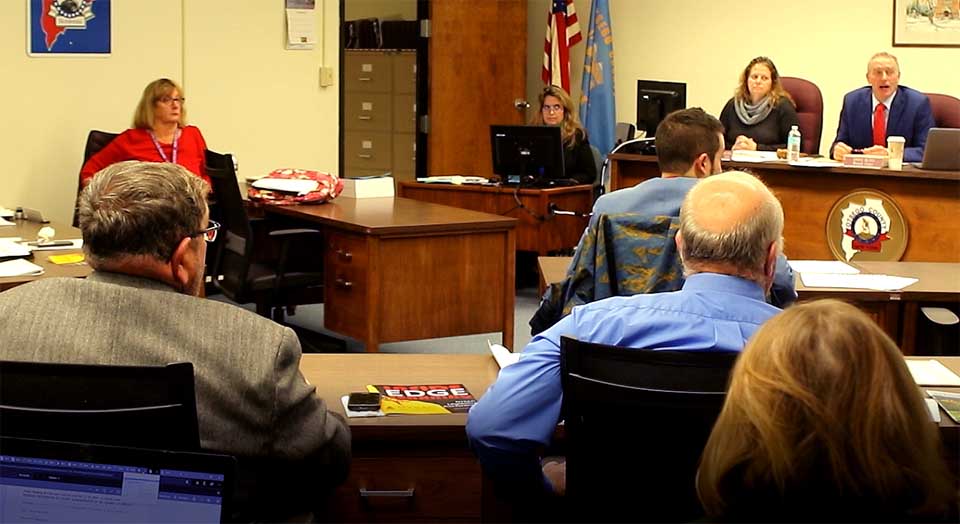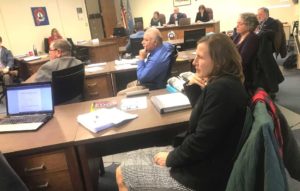CLICK FOR ADMINISTRATOR JOB DESCRIPTION
Past And Present
Collide In Debate
On Administrator
Planning v. ‘Dealing With It’
Explored; Also, Redistricting

By JIM KEVLIN • Special to www.AllOTSEGO.com
COOPERSTOWN – Three decades of striving ended today as the Otsego County Board of Representatives, 11-2-1, created the position of county executive.
 In a half-hour of give and take, it was clear that, despite and lopsided vote, starkly contrasting outlooks remain.
In a half-hour of give and take, it was clear that, despite and lopsided vote, starkly contrasting outlooks remain.
“You talk about planning,” said county Rep. Keith McCarty, R-East Springfield, and longest-serving board member. “You can’t plan when you’re going to get a flood. You can’t plan when a bridge is going to go out. You can’t plan when a road washes out – we’ve had two of them on the east side of Otsego Lake. You deal with it.”
Danny Lapin, D-Oneonta, who is finishing his first term, took on the rebuttal: “Our talents are hamstrung by a lack of coordination, a lack of planning, a lack of overall coordination.

“We have one of the larger road networks in our region, and yet we have no capital improvement plan to maintain our roads,” he continued. “We have millions of dollars in physical assets, and no capital improvement plan for our buildings. We contract with a number of organizations, but we have no point person monitoring their performance.”
McCarty praised the county board as it is, adding: “All you have to do is your job … You people underestimate yourselves.”
But Lapin said, “It’s not a binary choice. It’s a matter of: Can we do better?”
In addition to McCarty, the other nay vote was Kathy Clark, R-Otego, the former chairman. Clark’s vice chairman, Ed Frazier, R-Unadilla, who has been outspoken against the idea of a professional manager, absented himself today.
The aye votes included three Republicans, chairman David Bliss, Town of Middlefield; Peter Oberacker, Schenevus, who served on the Intergovernmental Affairs Committee (IGA) that developed the job description, and Dan Wilber, Burlington, a former department head.
In addition to Lapin, Democrats voting aye were IGA committee members Andrew Marietta, Fly Creek; Michelle Farwell, Gilbertsville, and Liz Shannon, Oneonta. They were joined by Andrew Stammel, Town of Oneonta, and Vice Chairman Gary Koutnik and Adrienne Martini, both from the City of Oneonta.

Meg Kennedy, C-Hartwick, IGA chair, rounded out the ayes, saying, “This county board has a tremendous amount of determination and fortitude … The county administrator is going to work with these individuals to build something that’s bigger than we are.”
The next step, after the board reorganizes in January, will be for Bliss to name a “transition committee” to begin the search, Kennedy said. The 2020 budget, also approved today, includes $75,000, the estimated half-year expense of a county administrator, with the idea that the search would take at least until next summer.
By acting today, the board’s last meeting of its two-year tenure, incoming county reps – Democrats Jill Basile and Clark Oliver from the City of Oneonta, succeeding Koutnik and Shannon, and Republican Rick Brockway of Laurens, succeeding Clark – will not be required to make a decision right out of the gate on an issue that will be unpopular in some quarters.
In choosing an administrator, the IGA rejected two other options: An elected county executive, who would have assumed much the board’s executive power, a step that would have required adoption of county charter. And a county manager, with perhaps hiring and firing powers.
In his comments, Bliss emphasized the new hire will be an “administrator” – someone who will “administer” to achieve county-board initiatives.
A half-dozen people spoke a the public hearing. Those favoring a county administrator included Jeff Woeppel, the Bassett administrator. David Petrie, Town of Hartwick, and Carl Wenner, Fly Creek, the former Otsego Town Board member, spoke against it.

Lacking hiring and firing powers – although conducting annual reviews of departments heads – will fail to give the new hire sufficient clout to succeed, said Clark. No CEO of a $120 million private company could succeed under those circumstances, she said.
She also pointed out challenges small counties are facing in keeping the top job full: Allegheny County’s manager retired in 2016 after a quarter century. His successor resigned in July. The man hired then quit in October, requiring that county board to bring back the second one “per diem” to help with the transition.
Another issue that surfaced was changing the size of the board: With a county administrator, is a board of 14 members making $14,000 each and a chair making $22,000 really necessary?
“I think it is something to examine,” Stammel said. When the Census results come back in 2021, “we should consider changing the number of representatives.”

Some warned against over-expectations, with Farwell saying, “I don’t thnk anybody here has the illusion that this person will be Superman who can solve all our problems and we’ll never make a mistake again,” adding, “it’s still the best decision we can make right now.”
The void between past and future that began the discussion resurfaced at the end, when Bliss, in remarks supporting the change, recalled a past board creating MOSA, the four-county garbage-collection system, only to have a later board take it apart.
McCarty fired back: “I don’t think you can sit there and blame the county reps for MOSA. Back in those days, DEC came in and shut down all those landfills and they (county reps) had no place to go. I don’t think you should blame previous boards: It was the way it had to go. We’d have to do the same thing today.”
“I’m not blaming them,” said Bliss. “They did the best thing they could at the time. And that’s what we’re doing today: acting on the best knowledge we have now.”


Great article and great summary. I wasn’t there, but I think I have a pretty good feel for how some of the representatives see the problem.
Mr. Lapin hit the nail on the head when he pointed out the lack of a coordinated approach to planning and problem solving in the County. A professional municipal director will give the County the coordinated approach it lacks.
I was delighted to see that Mr. Stammel believes we should reduce the size of the Board. Fourteen is too many for a population of about 65K. Now that the Board will not have to get down into the weeds on many decisions, it can be reduced to five people who can establish policy. Having a professional municipal director who cannot pick his team is a mistake, however. That person needs to have the authority to hire/fire those who are responsible for executing his plans and ideas. Without it, the County will be right back to where it is now: Fourteen directors with fourteen different priorities and approaches to problem-solving. Reduce the size of the Board to five members so that they can focus on creating the policies for the municipal director to execute. Note, too, that the cost-savings realized in the reduction in the size of the Board can help offset some of the cost of the executive municipal director.
Given the opportunity to truly democratize county government in Otsego County and end the practice of County employees answering to 14 bosses, the County Board instead has taken a costly, half-hearted, hurried approach that will achieve neither. As both Representative Clark at the board meeting and Mr. Talevi in his comments have pointed out, the administrator is an appointed bureaucrat and distinctly not a County Manager or a “CEO.” As Mr. Bliss continues to emphasize (as if this was a positive), the board will not be giving any of its current powers to the administrator. However, to the detriment of the taxpayers, the administrator will be paid at the going rate for a County Manager, but will basically be an intermediary gofer between the Board and the departments. This decision also fails to solve the other major problem with the current system: the Board is made up of members who have each been elected by a tiny fraction of the county’s voters so there is no political mandate from the voters as a whole for any particular course of action. Certainly there needs to be redistricting, eliminating the ridiculous weighted-voting system, and the terms of Board members should be lengthened to four years. But the central need is for an elected County Executive who will have a mandate from the voters of the County, unlike the current Board Chair, who is selected only by fellow Board members. The Board can then serve in the role it’s best suited for – the legislative branch of the County. Would the process for creating an Executive-and-Legislature government take longer than just creating a new non-executive position and adding $150K to the budget? Certainly. Are Board members serving 2-year terms feeling the need to do _something/anything_ before the end of the session? It seems so. The rush to propose the new position in November, with only two “public information sessions” (hosted by a group that openly favored the proposal) at which the public was instructed NOT to express their opinions but only ask questions on topics the Board chose, then holding the “public” hearing at 9 am on a weekday when few voters could attend – none of this reflects well on the process or the decision. The incoming Board would do well to put the brakes on this process, delay or cancel any search for an administrator, and engage the voters of the county on the course they would prefer to choose.